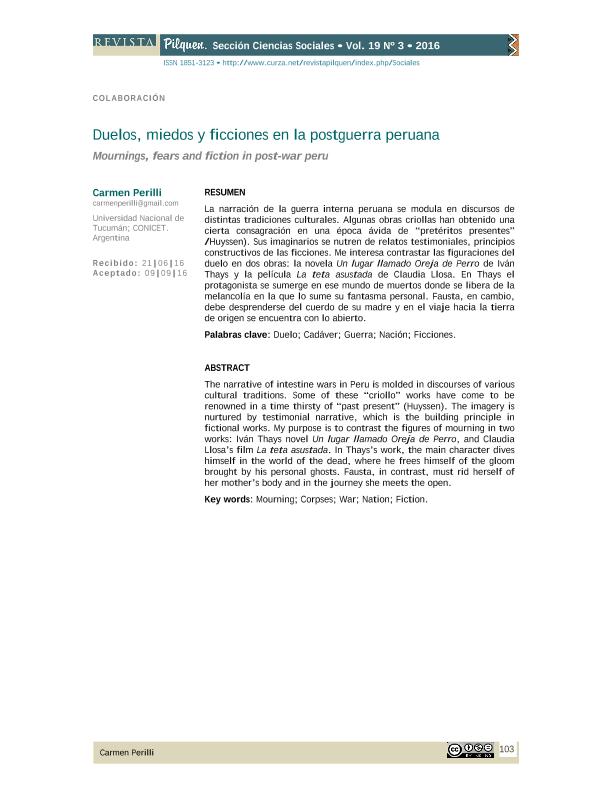Mostrar el registro sencillo del ítem
dc.contributor.author
Perilli, Carmen Noemi

dc.date.available
2018-03-01T17:38:57Z
dc.date.issued
2016-09
dc.identifier.citation
Perilli, Carmen Noemi; Duelos, miedos y ficciones en la postguerra peruana; Universidad Nacional del Comahue. Centro Universitario Regional Zona Atlántica; Revista Pilquen. Sección Ciencias Sociales; 19; 3; 9-2016; 103-110
dc.identifier.issn
1851-3123
dc.identifier.uri
http://hdl.handle.net/11336/37542
dc.description.abstract
La narración de la guerra interna peruana se modula en discursos de distintas tradiciones culturales. Algunas obras criollas han obtenido una cierta consagración en una época ávida de “pretéritos presentes” /Huyssen). Sus imaginarios se nutren de relatos testimoniales, principios constructivos de las ficciones. Me interesa contrastar las figuraciones del duelo en dos obras: la novela Un lugar llamado Oreja de Perro de Iván Thays y la película La teta asustada de Claudia Llosa. En Thays el protagonista se sumerge en ese mundo de muertos donde se libera de la melancolía en la que lo sume su fantasma personal. Fausta, en cambio, debe desprenderse del cuerdo de su madre y en el viaje hacia la tierra de origen se encuentra con lo abierto.
dc.description.abstract
The narrative of intestine wars in Peru is molded in discourses of various cultural traditions. Some of these “criollo” works have come to be renowned in a time thirsty of “past present” (Huyssen). The imagery is nurtured by testimonial narrative, which is the building principle in fictional works. My purpose is to contrast the figures of mourning in two works: Iván Thays novel Un lugar llamado Oreja de Perro, and Claudia Llosa’s film La teta asustada. In Thays’s work, the main character dives himself in the world of the dead, where he frees himself of the gloom brought by his personal ghosts. Fausta, in contrast, must rid herself of her mother’s body and in the journey she meets the open.
dc.format
application/pdf
dc.language.iso
spa
dc.publisher
Universidad Nacional del Comahue. Centro Universitario Regional Zona Atlántica
dc.rights
info:eu-repo/semantics/openAccess
dc.rights.uri
https://creativecommons.org/licenses/by-nc-sa/2.5/ar/
dc.subject
Perú
dc.subject
Guerra
dc.subject
Duelo
dc.subject
Ficción
dc.subject.classification
Estudios Generales del Lenguaje

dc.subject.classification
Lengua y Literatura

dc.subject.classification
HUMANIDADES

dc.title
Duelos, miedos y ficciones en la postguerra peruana
dc.title
Mournings, fears and fiction in post-war Peru
dc.type
info:eu-repo/semantics/article
dc.type
info:ar-repo/semantics/artículo
dc.type
info:eu-repo/semantics/publishedVersion
dc.date.updated
2017-12-12T20:02:35Z
dc.journal.volume
19
dc.journal.number
3
dc.journal.pagination
103-110
dc.journal.pais
Argentina

dc.journal.ciudad
Viedma
dc.description.fil
Fil: Perilli, Carmen Noemi. Consejo Nacional de Investigaciones Científicas y Técnicas. Centro Científico Tecnológico Conicet - Tucuman. Instituto de Investigaciones Sobre El Lenguaje y la Cultura. Universidad Nacional de Tucuman. Facultad de Filosofía y Letras. Cátedra de Literatura Argentina. Instituto de Investigaciones Sobre El Lenguaje y la Cultura; Argentina
dc.journal.title
Revista Pilquen. Sección Ciencias Sociales
dc.relation.alternativeid
info:eu-repo/semantics/altIdentifier/url/http://revele.uncoma.edu.ar/htdoc/revele/index.php/Sociales/article/view/1433
dc.relation.alternativeid
info:eu-repo/semantics/altIdentifier/url/http://ref.scielo.org/nsphrg
dc.relation.alternativeid
info:eu-repo/semantics/altIdentifier/url/http://www.redalyc.org/pdf/3475/Resumenes/Resumen_347547503009_1.pdf
Archivos asociados
